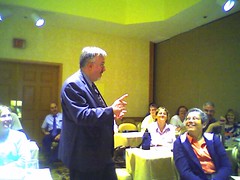It’s 2:45 AM and I’m up, packed and ready to head to the airport. This was typed fast, so please forgive misspellings. 
I have to say that I had a couple of incredible days in Tucson, where the Amphitheater School District put on a Literacy in the 21st Century conference for their teachers and educators from other Arizona districts. I was quite impressed with the turn out, especially the percentage of educators who had attended all four of the annual events.
The rest of the presenters were exploring new techniques for teaching the more traditional literacy skills. At least that’s the impression that I got from the session descriptions. And this is right on the mark. Nothing of the old goes away. It simply becomes more important than ever before. I appear to have been the only technology (slash) new literacy vision person there, and the interest in a new sense of basic skills in the 21st century was evident by the overwhelming turnout at my sessions. But I certainly didn’t see everyone during the general conference, until the closing keynote address, right after lunch.
I usually dread speaking at a banquet, but this was fine. Everyone was perfectly polite with their silverware 😉 I suspect though, that I rocked the ground of more than a few people, and gave them something to think about over the coming months of R&R and summer jobs. Here are a few of the phrases that may have surprised a few:
- We need to spend less time teaching our children to use paper and more time teaching them to use light.
- The future that we are preparing our children for will be the future that they choose, invent, and pay for. We need to be paying a lot of attention to our children.
- Part of being literate is being willing, able, and encouraged to ask questions about the answers that you find.
- Most of the time, when we are solving problems with numbers, they are not coming as a dozen numbers on a piece of paper, but a thousand numbers, and they’re digital.
- We are overwhelmed by information, but the biggest problem is not managing that information. It’s getting our message through all of that information. Students who can not produce messages that compete for attention will not be literate.
- It is crucial that the ethics of information be an explicit part of our definition of literacy.
- If we believe that we can better prepare our children for the 21st century by not teaching them music and art, then our schools have become factories.
- We will have achieved real education reform when no teacher believes that they can teach the same thing, the same way, year after year. We must have an education system that provides teachers with the resources and the time to retool their classrooms every day. Anything less, and all we’re doing is just a better job of preparing our children for the 1950s.
Off to the airport…
